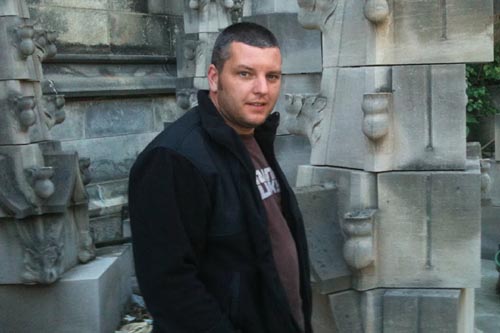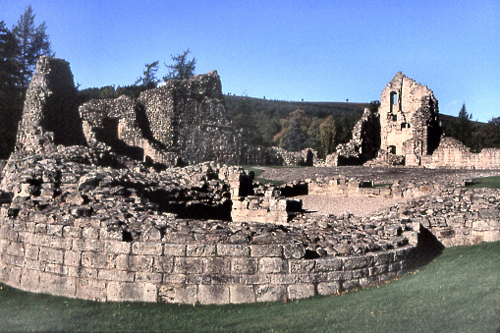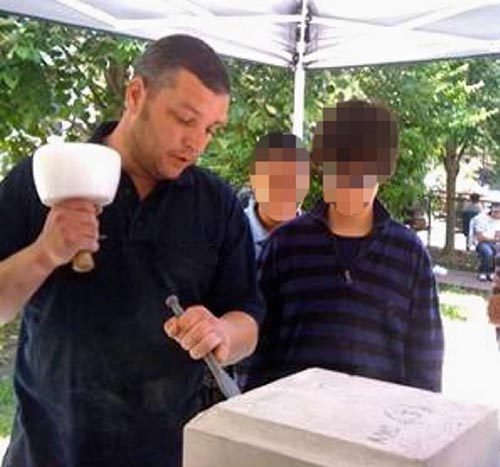MORE than 700 years since it defended Robert the Bruce’s family against enemy armies, a Scottish castle’s defences appear to have claimed another victim.
One of Scotland’s top stonemasons is suing for more than £200,000 after he fell into Kildrummy Castle’s ancient moat.
Malcolm Hutcheon, 41, was working on the Aberdeenshire ruin when the accident happened.
Malcolm Hutcheon is seeking £200,000 from Historic Scotland
He says he plummeted almost ten feet into the dry castle moat after a makeshift bridge gave way.
Mr Hutcheon says he was left with serious injuries to leg, needing surgery two years later.
He is claiming the money in damages from Historic Scotland, the quango charged with maintaining the country’s historic monuments.
The same organisation vaunted Mr Hutcheon a year later as a leading stonemason as he travelled to New York to teach young people the trade.
In papers lodged at the Court of Session in Edinburgh, lawyers for Mr Hutcheon say Historic Scotland did not take reasonable care of him and left him at a disadvantage in the labour market.
The fall happened on 15 January 2009, when Mr Hurtheon was part of a four-man Historic Scotland team tasked with clearing moss from the ruined castle.
Mr Hutcheon said: “I was aware the timber boards had been replaced and the temporary ones looked in bad condition. I started pushing the wheelbarrow and about half-way across, the beam just gave way. I fell straight down about ten feet into the pit, landing square on my feet and ankles. I felt the shock of the impact go right through my body. I couldn’t get up or put weight on it. So I was lying there bawling for help. It was 15 minutes before anyone realised I was missing.”
Doctors were unable to assess the damage to Mr Hutcheon’s right ankle until the swelling subsided, which took two weeks.
“They said there wasn’t a break on my ankle but I was convinced there was something seriously wrong with my knee,” he said.
“There’s not a day when I’m not in pain. I’m limping when I walk and I can’t walk long distances and I really struggle on rough terrain.
“At work I cannot carry anything over ten kilos, I can’t climb ladders or scaffolding. I’m basically not allowed to do my job. I’ve been doing general site maintenance for two and a half years. I’ve lost three years of my life and that’s time I’ll never get back.”
Mr Hutcheon’s lawyers say: “The entranceway had a moat underneath it.
“It was an open pit. It was about 3 metres deep. It was uncovered.”
The flooring of a permanent bridge had been removed prior to Mr Hutcheon’s arrival, his lawyers said.
They continue: “Wooden scaffolding battens had been placed three abreast to form a temporary ‘bridge.'”
A tempoary bridge at Kildrummy Castle broke, causeing Mr Hutcheon to plunge into the moat Photo:Anne Burgess
Mr Hutcheon was taking the moss in a wheelbarrow across the bridge to a trailer when the wooden plank snapped.
The papers continue: “The pursuer [Mr Hutcheon] was approximately half way across when one of the battens in the centre of the width of the temporary “bridge” broke and gave way.
“The pursuer fell a distance of about 3 metres into the pit.”
Mr Hutcheon’s lawyers say the battens were discoloured, and he knew the bridge had been used before he arrived.
The papers say he was unable to summon help for 15 minutes before being discovered by a colleague.
He was later driven to the Jubilee Hospital in Aberdenshire.
They say he suffered “significant injury” to his right ankle, and later had to undergo surgery.
Mr Hutcheon’s lawyers say: “He is restricted in his ability to walk long distances, to walk over uneven ground, and to climb ladders.”
They say his wife had to help him with “tasks of daily living and personal care” as he recovered, and he has developed a pain in his right knee.
He remained at work with Historic Scotland though was restricted to “light duties.”
Mr Hutcheon had planned on entering the private sector
The stonemason had planned on entering the private sector, but was unable to because of his injuries.
He is claiming for past and future wage losses as well as expenses.
Lawyers for Historic Scotland admit the bridge gave way as Mr Hutcheon was transporting moss across it.
Historic Scotland say the sum sued for is excessive, but they are willing to admit liability for “reasonable reparations” for the accident.
They are disputing Mr Hutcheon’s injuries came from the accident, saying he has had other health problems.
“He did not complain of pain in his right knee until October 2009,” the quango’s lawyers say.
They say the sum sued for is excessive.
Mr Hutcheon would later travel to New York as part of a Historic Scotland team to teach young people in Harlem the art of stonemasonry.
He said being part of the project, announced in April 2010 was a “huge honour.”
At the time, Culture Minister Fiona Hyslop said: “By visiting the project and helping to train young people we hope to provide them with skills which will help them to not only care for their historic fabric, but also equip them with knowledge to help build sustainable and long term careers.”
A spokesman for Historic Scotland said of the legal bid: “There has been no agreement as yet in this case.
“We continue to pursue a solution with the individual and his representatives.”
Mr Hutcheon would not be the first person to fall victim to Kildrummy castle’s defences.
It was used as a stronghold for Robert the Bruce’s family in 1306 when enemy forces laid siege to it in as part of the Scottish Wars of Independence.
His brother Sir Neil Bruce’s position was only overcome when a traitor in his own camp set fire to a grain store in the castle’s great hall.
Kildrummy, one of medieval Scotland’s most formidable castles, was again used by the Bruce family in 1335, and successfully held off another siege.
The castle was to play an important role in Scottish history 400 years later. The Earl of Mar plotted to support the Jacobite uprising there, but had to flee after he was defeated.



